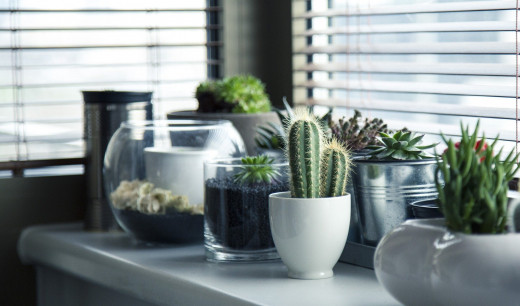How Your Habits Keep Your Home Organized
The Trouble with Decluttering and Organizing
As a professional organizer, I find it so frustrating seeing a clear, organized space created through hard work devolve into messy piles. If you’ve ever spent a weekend focused on organizing a space in your home, you know how discouraging it can be to notice that a new mess has formed days, weeks, or, if you’re lucky, months later.
The trouble with decluttering and organizing is that we treat those actions as goals with a finish line as opposed to a practice.
Imagine someone running a race. As they cross the finish line, are they thinking, “Well, I’m done with running?” No. After resting, they return to their running routine. They know that each practice session will allow them to cross multiple finish lines in the future.
And, that’s the way to look at decluttering and organizing. Not as a finish line but as a series of routines that allows you to invite guests into your home without feeling embarrassed or stressed by trying to hide things out of sight; and that makes your home a pleasant space for your family to do the things they want to do.
Order Doesn't Happen Overnight

Forming New Habits Doesn’t Sound Fun
However, the benefit of a habit is that you don’t have to think about it; you do it automatically.
Tidying Habits for Your Home
The habits you’ll want to form are those that will keep your home neat. If you live alone in an apartment, your routine will look very different than a family with four kids living in a 2500-square-foot house.
Don’t panic with the list below! You don’t have to do all these activities at one time. The rest of the article will discuss how to turn these actions into habits.
Bedrooms
- Make the bed every morning.
- Pick up clothing and hang it in the closet or put it in the hamper.
Kitchen
- Wash dishes or put them in the dishwasher.
- Put away things set on the counters that belong someplace else.
- Wipe down counters and stovetop.
Living Room or Family Room
- Pick up and put away toys, games, craft supplies.
- Return DVDs to cases and put on shelf.
- Put the remotes where they belong so they can be found the next day.
- Fold the afghan; plump and straighten the pillows.
- Pick up any trash from snacks. Bring dishes to the kitchen.
- Put magazines where they belong.
Bathroom
- Stow grooming supplies in drawers.
- Hang towels.
Kids
- Pick up and put away toys.
- Empty contents of the lunchbox.
- Empty contents of the backpack and either toss what isn’t wanted or file what’s needed for reference.
- Set homework, library books, sports equipment, musical instruments and any other items required for the next day in or near the backpack.
Home Office
- Clear off desk.
- Put things that need to be dealt with soon into an inbox.
- Glance through email and delete offers that don’t apply to you right now. See if there is anything that needs a response. Plan when to read articles and blogs.
Incoming
- Sort mail and put junk mail in recycling.
- Put mail that requires a future action in a file or holder that you’ll look at on a specific day.
- Store any purchases where they belong.
- Set any school or work papers where it will be done.
- Pull receipts from your wallet or purse. Toss or move to a file until you reconcile them with bank statements or file receipts for large purchase.
Doing Something Once Is Not a Habit

Pick the Three Habits You Most Want to Form
If you try to do too much all at once, you'll end up frustrated instead of feeling successful.
How to Form a New Habit
Forming a new habit isn’t easy. You want to make the process simple and obvious, so you want to do it. For example, if you want to put something in a drawer, but the drawer is already filled, it’ll be impossible to do what seems like a simple task (put this in the drawer).
When this happens, you become frustrated. You might end up thinking, “This is impossible. I’ll never get organized.”
It’s important to plan out how you’ll engage in a habit as opposed to assuming you’ll just start to do it.
Try some of the following techniques to form the habits you want.
Habit Forming Technique #1
See yourself as the type of person who does the task. If you think that making your bed is something that fussy people do, and you don’t see yourself as a fussy person, then you’ll have a difficult time developing this habit.
Change the way you think about yourself, “I’m the type of person who keeps a clean desk. I’m the type of person who puts his dirty clothing in the hamper.”
Habit Forming Technique #2
Pair the new habit with something you already do. If you’re in the habit of sorting through your mail and pulling out the junk mail, then immediately after doing this task, open envelopes and put mail into a holder that you’ll go through when you’re ready to pay bills or carry out other actions.
Since you already engage in some habits, you can add on another habit. When you do the action that you’re already used to, you’ll have an obvious reminder to do the new habit.
Habit Forming Technique #3
Make small changes. It would be fantastic to wake up and do all the things you want to without any struggle, but habits don’t form just because you want them to. You need to decide to engage in the habit and then actually do the habit consistently.
If you’ve tried to start a habit in the past and didn’t succeed, it may be that you were expecting a dramatic change. Instead, you want to bring the habit down to a ridiculously easy level. Let’s say that you want to clear off your desk at the end of each day.
You could start with the habit of removing any mugs, glasses, or dishes at the end of the day. When that becomes a habit, develop the routine of putting pens and other office supplies away. When that’s part of your routine, make a point of filing papers that you’re done with.
Each time, you are tweaking the habit to include additional, small, tasks.
Focus on What You've Accomplished

Keep Your Home Organized
Remember, creating an organized home isn’t a finish line. It will become easier to maintain order at home with time. You’re developing life-long skills, so don’t push yourself trying to do everything perfectly within a week or month.








